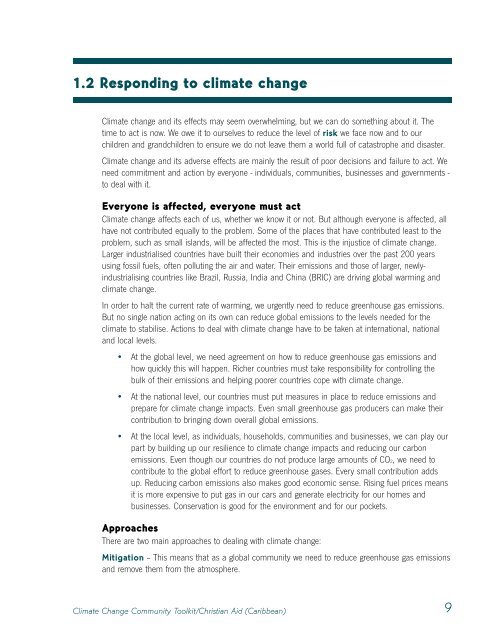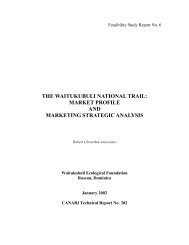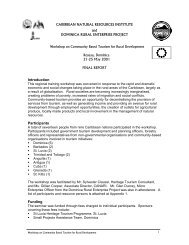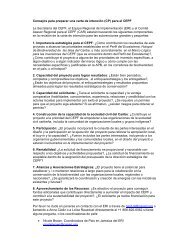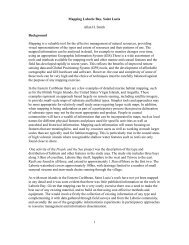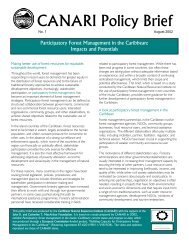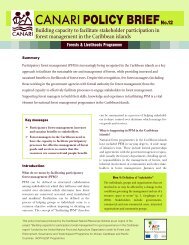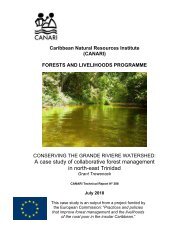Addressing Climate Change in the Caribbean: A Toolkit ... - CANARI
Addressing Climate Change in the Caribbean: A Toolkit ... - CANARI
Addressing Climate Change in the Caribbean: A Toolkit ... - CANARI
You also want an ePaper? Increase the reach of your titles
YUMPU automatically turns print PDFs into web optimized ePapers that Google loves.
1.2 Respond<strong>in</strong>g to climate change<br />
<strong>Climate</strong> change and its effects may seem overwhelm<strong>in</strong>g, but we can do someth<strong>in</strong>g about it. The<br />
time to act is now. We owe it to ourselves to reduce <strong>the</strong> level of risk we face now and to our<br />
children and grandchildren to ensure we do not leave <strong>the</strong>m a world full of catastrophe and disaster.<br />
<strong>Climate</strong> change and its adverse effects are ma<strong>in</strong>ly <strong>the</strong> result of poor decisions and failure to act. We<br />
need commitment and action by everyone - <strong>in</strong>dividuals, communities, bus<strong>in</strong>esses and governments -<br />
to deal with it.<br />
Everyone is affected, everyone must act<br />
<strong>Climate</strong> change affects each of us, whe<strong>the</strong>r we know it or not. But although everyone is affected, all<br />
have not contributed equally to <strong>the</strong> problem. Some of <strong>the</strong> places that have contributed least to <strong>the</strong><br />
problem, such as small islands, will be affected <strong>the</strong> most. This is <strong>the</strong> <strong>in</strong>justice of climate change.<br />
Larger <strong>in</strong>dustrialised countries have built <strong>the</strong>ir economies and <strong>in</strong>dustries over <strong>the</strong> past 200 years<br />
us<strong>in</strong>g fossil fuels, often pollut<strong>in</strong>g <strong>the</strong> air and water. Their emissions and those of larger, newly<strong>in</strong>dustrialis<strong>in</strong>g<br />
countries like Brazil, Russia, India and Ch<strong>in</strong>a (BRIC) are driv<strong>in</strong>g global warm<strong>in</strong>g and<br />
climate change.<br />
In order to halt <strong>the</strong> current rate of warm<strong>in</strong>g, we urgently need to reduce greenhouse gas emissions.<br />
But no s<strong>in</strong>gle nation act<strong>in</strong>g on its own can reduce global emissions to <strong>the</strong> levels needed for <strong>the</strong><br />
climate to stabilise. Actions to deal with climate change have to be taken at <strong>in</strong>ternational, national<br />
and local levels.<br />
• At <strong>the</strong> global level, we need agreement on how to reduce greenhouse gas emissions and<br />
how quickly this will happen. Richer countries must take responsibility for controll<strong>in</strong>g <strong>the</strong><br />
bulk of <strong>the</strong>ir emissions and help<strong>in</strong>g poorer countries cope with climate change.<br />
• At <strong>the</strong> national level, our countries must put measures <strong>in</strong> place to reduce emissions and<br />
prepare for climate change impacts. Even small greenhouse gas producers can make <strong>the</strong>ir<br />
contribution to br<strong>in</strong>g<strong>in</strong>g down overall global emissions.<br />
• At <strong>the</strong> local level, as <strong>in</strong>dividuals, households, communities and bus<strong>in</strong>esses, we can play our<br />
part by build<strong>in</strong>g up our resilience to climate change impacts and reduc<strong>in</strong>g our carbon<br />
emissions. Even though our countries do not produce large amounts of CO2, we need to<br />
contribute to <strong>the</strong> global effort to reduce greenhouse gases. Every small contribution adds<br />
up. Reduc<strong>in</strong>g carbon emissions also makes good economic sense. Ris<strong>in</strong>g fuel prices means<br />
it is more expensive to put gas <strong>in</strong> our cars and generate electricity for our homes and<br />
bus<strong>in</strong>esses. Conservation is good for <strong>the</strong> environment and for our pockets.<br />
Approaches<br />
There are two ma<strong>in</strong> approaches to deal<strong>in</strong>g with climate change:<br />
Mitigation – This means that as a global community we need to reduce greenhouse gas emissions<br />
and remove <strong>the</strong>m from <strong>the</strong> atmosphere.<br />
<strong>Climate</strong> <strong>Change</strong> Community <strong>Toolkit</strong>/Christian Aid (<strong>Caribbean</strong>) 9


